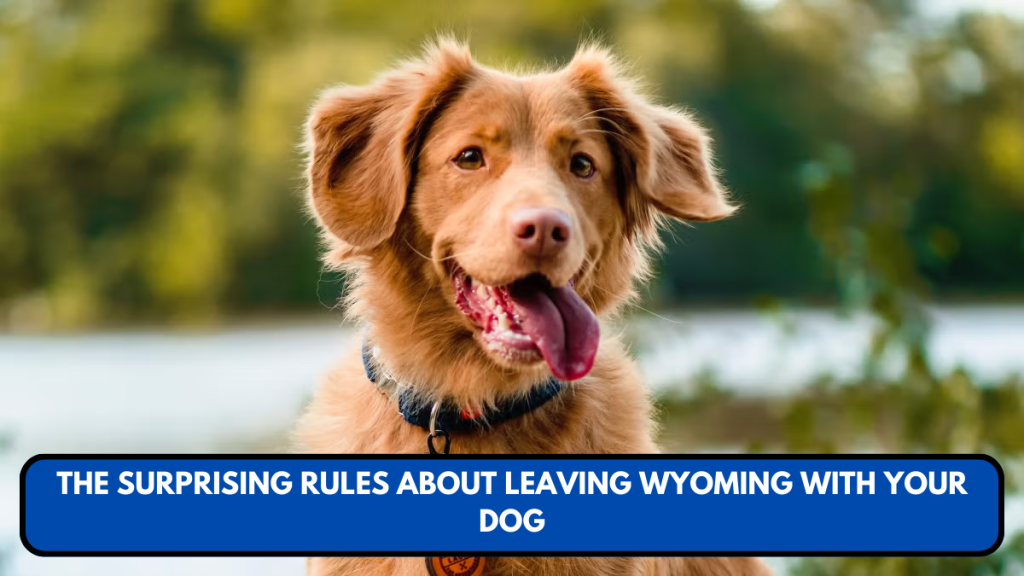
If you’re planning a trip out of Wyoming and bringing your furry friend along, there are a few hurdles you should be aware of. While road-tripping or flying with your dog might sound simple, crossing state lines — or even international borders — comes with legal and health requirements that many pet owners overlook. These rules aren’t just red tape; they exist to protect both pets and public health.
This article breaks down the most important things to know before you leave Wyoming with your dog, from paperwork and vaccinations to state-specific laws.
1. Health Certificates: The Essential Document
One of the most critical requirements when traveling with your dog out of Wyoming is securing an Interstate Certificate of Veterinary Inspection (ICVI), commonly known as a health certificate. This document must be issued by a USDA-accredited veterinarian, usually within 10–30 days of your trip, depending on your destination.
A health certificate verifies that your dog:
- Is free from contagious diseases
- Has no visible signs of illness
- Is up-to-date on required vaccinations, especially rabies
Without this certificate, you could face delays, fines, or even denial of entry into another state or country.
Check state requirements here: USDA Pet Travel – State to State
2. Rabies Vaccination: Non-Negotiable

Nearly every U.S. state and foreign country requires proof of rabies vaccination. Wyoming’s own regulations are in line with this, and failing to provide valid documentation could lead to quarantine requirements or entry refusal.
Make sure your dog’s rabies certificate includes:
- The date of vaccination
- The vaccine’s expiration date
- Veterinarian’s signature and license number
Some states may also require that the vaccination be administered at least 30 days prior to travel.
3. State-Specific Rules Vary
Each state in the U.S. can implement its own rules for animals entering from out-of-state. For instance:
- California may require specific parasite treatments
- Florida may mandate a shorter window for health certificate issuance
- Hawaii has a strict quarantine process for all incoming pets
It’s essential to research the rules for your specific destination well in advance of your trip.
Use this tool to verify state laws: APHIS – State Entry Requirements
4. International Travel: More Complicated Than You Think
If you’re traveling outside the United States, the requirements become even more complex:
- Your dog may need to be microchipped
- Additional vaccinations (like for distemper or leptospirosis) may be required
- Some countries require blood titer tests or even quarantine periods
- Many destinations demand import permits or pre-approval from authorities
A USDA-endorsed international health certificate is often mandatory and needs to be processed through USDA APHIS Veterinary Services.
Learn about pet travel abroad: USDA Pet Travel – International
5. Traveling by Car? Vehicle Safety Laws Vary
In Wyoming, there are no explicit laws requiring dogs to be restrained while traveling in a vehicle. However, neighboring states may have safety laws that apply:
- Some states mandate the use of dog seat belts or crates
- Others may prohibit animals from riding in a driver’s lap
- Unrestrained dogs in truck beds can be considered animal cruelty
While enforcement may be rare, failing to follow these laws can result in fines or citations, especially if an accident occurs.
More on Wyoming car laws for dogs: My Country 95.5 – Dog Travel Laws
6. Don’t Leave Your Dog Alone in the Car
Another common travel mistake is leaving your dog alone in a parked car. Even in Wyoming’s cooler climate, this can be dangerous — and potentially illegal:
- Temperatures inside cars can rise rapidly, even in moderate weather
- Some states have laws allowing passersby or law enforcement to break windows to rescue animals
- Depending on the situation, leaving your pet in a car could be charged as animal cruelty
Learn more about this issue: Dogster – Is It Illegal to Leave Your Dog in the Car?
7. Don’t Forget Local Ordinances

Beyond state and federal laws, local municipalities often have their own pet regulations. These can include:
- Leash laws
- Breed restrictions
- Pet licensing requirements
It’s a good idea to check with your destination’s city or county animal control office before traveling. You don’t want to arrive at your Airbnb only to discover your dog isn’t allowed in the neighborhood.
Final Tips for Stress-Free Travel with Your Dog
- Visit your vet early and explain your travel plans
- Secure documentation in a folder or digital file
- Prepare your vehicle or carrier with restraints, water, and ventilation
- Double-check destination rules for both interstate and international travel
- Plan ahead to avoid rushed paperwork or denied entry
Traveling with your dog can be a fun and rewarding experience — but only if you’re prepared. The laws may seem like a hassle, but they’re ultimately there to keep both your dog and other animals safe.
Make sure you check all the boxes before leaving Wyoming. It’s the difference between a smooth trip and a logistical nightmare.



